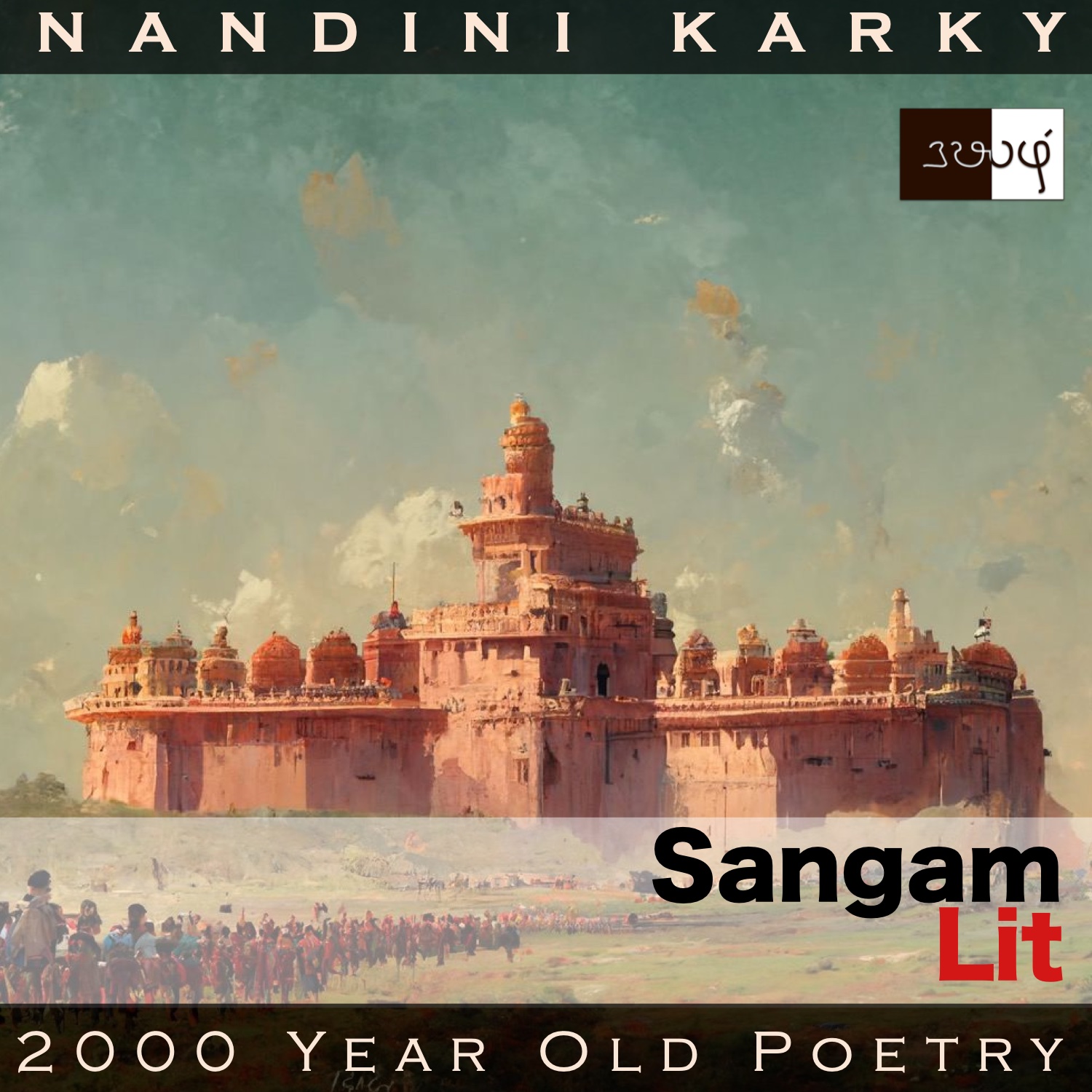Podcast: Play in new window | Download
Subscribe: Apple Podcasts | Spotify | Amazon Music | Android | iHeartRadio | TuneIn | RSS | More

In this episode, we observe the influence of poets in a king’s court, as portrayed in Sangam Literary work, Puranaanooru 44, sung to the Chozha king Nedunkilli by the poet Kovoor Kizhaar. The verse is situated in the category of ‘Vaagai Thinai’ or ‘king’s victory’ and advises the king on the course of action in the midst of a siege.
இரும் பிடித் தொழுதியொடு பெருங் கயம் படியா,
நெல்லுடைக் கவளமொடு நெய்ம் மிதி பெறாஅ,
திருந்து அரை நோன் வெளில் வருந்த ஒற்றி,
நிலமிசைப் புரளும் கைய, வெய்து உயிர்த்து,
அலமரல் யானை உரும் என முழங்கவும்,
பால் இல் குழவி அலறவும், மகளிர்
பூ இல் வறுந் தலை முடிப்பவும், நீர் இல்
வினை புனை நல் இல் இனைகூஉக் கேட்பவும்,
இன்னாது அம்ம, ஈங்கு இனிது இருத்தல்;
துன் அருந் துப்பின் வய மான் தோன்றல்!
அறவை ஆயின்,’ நினது’ எனத் திறத்தல்;
மறவை ஆயின், போரொடு திறத்தல்;
அறவையும் மறவையும் அல்லையாக,
திறவாது அடைத்த திண் நிலைக் கதவின்
நீள் மதில் ஒரு சிறை ஒடுங்குதல்
நாணுத்தகவு உடைத்து, இது காணுங்காலே.
Not only is a new king being sung about, but the context is unique as well. Let’s discuss more about that after we delve into the translation of this poet’s words:
“Unable to go along with the herd of dark, female elephants to the wide water ponds, and unable to have the huge ball of rice mixed with ghee, dashing against strong posts with smoothened surfaces, with trunks rolling on the ground, sighing out with hot breaths, suffering-filled elephants roar; Infants without milk cry aloud; Maiden tie-up their dry hair, bereft of flowers and oil; Those who live in well-designed, fine houses lament without water; Even after hearing all these cries, that you remain here pleasantly is not right, O king who has many speedy horses, unparalleled in strength!
If you want to follow the path of justice, open the door and declare ‘It’s yours!’; Else, if you want to follow the path of courage, open the door and declare war; Without justice or courage, if you hide behind the long walls of these unopened, sturdy doors, that is something shameful to behold!”
Now, for the nuances within! The poet starts by zooming onto a battle elephant belonging to this king. He talks about how this elephant is not free to go along with the female elephants to water ponds. Then turning from freedom to food, the poet mentions how this elephant is not getting its meal of rice mixed with ghee either. No wonder the elephant dashes against its post and trumpets aloud. Even as this loud sound booms in the air, there’s the heart-wrenching sound of infants crying without milk. And then, if one were to listen even closely, there would be the sound of women folk tying up their rather dry hair; There’s a subtle significance in this statement implying that the men were away at war during which time Sangam women shunned adorning their hair with oil or flowers; Returning to the sounds in the air, next the poet points out how people who live in well-built mansions were despairing without water. All these are sure-fire signs of a siege by an enemy king.
Then, the poet turns to the king and says that if you do not heed all these sounds around and seem to be content to remain here, then that is not right. Now is the time to ask the question, ‘where exactly is this king and why is that a fault?’. The answer lies in the context of the verse. Another Chozha king Nalankilli, whom we have seen praised and celebrated before, is said to have laid siege to the fort of this Chozha king Nedunkilli. So, we can infer the poet is accusing king Nedunkilli of remaining apathetic to the horror unfolding in his country and remaining within the safety of his fort walls.
After cheering the king by praising his horses, the poet comes to the crux of the matter. He’s not simply criticising the king and going his way but showing him what to do. The poet says that there are two paths before the king. One is to choose the path of justice and the other is to choose the path of bravery. If the king were to choose justice or peace, all he needed to do was to open his fort doors and declare to the enemy king, ‘The fort is yours!’. If the king were to choose the path of bravery or war, then again, he had to open the door and go face the enemy king with all the strength he has. Without choosing either paths, if the king were to hide behind the long walls and not open his fort doors, that was the most shameful thing ever, the poet concludes!
Indeed, an effective argument against inaction – Don’t cower within, do or die, the poet seems to cry and asks the king to open his fort doors, one way or the other! And not just that, through this verse, we gain insight about the leverage a poet had in a king’s court. Looks like poets were not there only to pay tributes to the king and praise him to the skies. They seemed to be capable of saying daring things that people would be afraid to say to those in power. How much courage would it take to tell a powerful leader what you are doing is wrong? Even today, with all our freedom and privilege, not many dare to stand up to their leaders when they are in the wrong. Perceiving that Tamil society allowed this to happen two thousand years ago is immensely heartening! If those ancient people could stand tall before their monarchs, who had absolute power, and say this is right and this is wrong, then, how much easier it is for us, the people of this modern world, to do the same before our elected leaders? The question is, will we?




Share your thoughts...